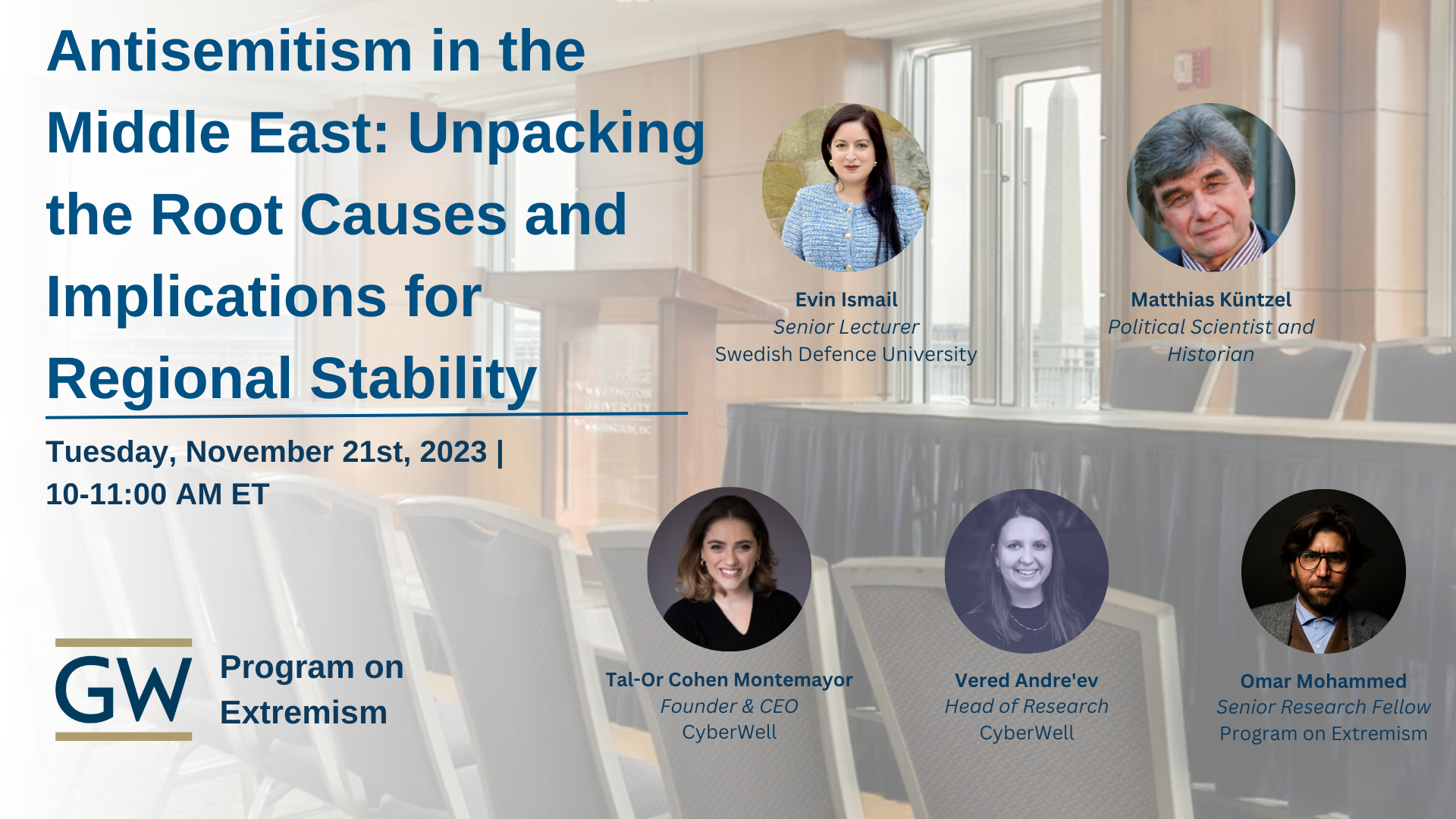Antisemitism in the Middle East: Unpacking the Root Causes and Implications for Regional Stability

On November 21st at 10 AM US ET, the Program on Extremism at The George Washington University hosted a virtual discussion on antisemitism in the Middle East. Antisemitism has long been a deeply entrenched issue in the Middle East. In the aftermath of the October 7th attacks by Hamas against Israel, social media platforms have observed an unprecedented surge in antisemitic rhetoric emanating from the region. This resurgence prompts critical questions: Can this issue be comprehensively discussed? And can antisemitism in the Middle East be effectively addressed? Furthermore, what entities are relevant for engaging in an open dialogue on this subject? In this event, we explored the implications of this rise in antisemitism in the Middle East and its wider consequences.
This event was moderated by Senior Research Fellow Omar Mohammed and featured insights from:
- Evin Ismail, Senior Lecturer in Political Science at the Swedish Defence University
- Matthias Küntzel, Political Scientist and Historian
- Tal-Or Cohen Montemayor, Founder & CEO of CyberWell
- Vered Andre'ev, Head of Research at CyberWell
Vered Andre’ev opened the discussion by presenting CyberWell’s research on the various antisemitic tropes that have spread rapidly since the October 7th attacks in Southern Israel. In this time period, CyberWell’s AI tech identified an 86% increase in content flagged as antisemitic. Additionally, there has been a shift from dehumanizing Jewish people pre-conflict, to directly calling for violence against Jewish people post-conflict. Overall, these narratives seek to condemn the Jewish population for the actions of the Israeli Defense Forces. Tal-Or Cohen Montemayor then provided several policy recommendations based on CyberWell’s findings. First, she recommended closing the enforcement gap in content moderation between English and non-English violative posts. She also promoted the use of positive engagement pop-ups for users who search terms linked to hate speech to counteract antisemitic rhetoric and conspiracy theories. Finally, she noted the need for the robust application of automatic flagging of hate speech online in order to more effectively counter the spread of this content.
The next speaker was Evin Ismail, who discussed the evolution of antisemitism within the Islamist milieu. Ismail described how the Muslim Brotherhood based its movement on the concept of “lost dignity” caused by British imperialism. Ismail argued that this notion was channeled into the ideas of European Nazism that blamed “the Jew” for the ills of the world. Ismail argued that contemporary Islamist antisemitism is based on 1) the Gharqad tree hadith and 2) the conspiratorial beliefs surrounding the alleged role of “the Jews” in perpetuating the war against Islam. Taken together, Islamist movements are able to politicize religious identity and position Jews as either political subjects or perpetrators in the war against Islam.
The final speaker was Matthias Küntzel who discussed how Nazi antisemitism reached the Middle East and the significance it plays in the conflict today. Küntzel detailed the findings of his book, Nazis, Islamic Antisemitism and the Middle East. First, Küntzel argued that Nazi ideologues saw the 1948 conflict in Palestine as an opportunity to further anti-Semitic narratives. According to Küntzel, Nazi propaganda sought to embed antisemitism into the consciousness of the Arab world through the use of tailored antisemitic interpretations of Islam and the Quran. Küntzel argued that this development popularized the European World conspiracy myth, and shaped a genocidal rhetoric towards Zionism that continues today. Finally, Küntzel described the origins and roots of the Muslim Brotherhood as the world’s largest antisemitic movement. He discussed the wide-ranging consequences of the Brotherhood’s growth, including the popularization and growth of antisemitic sentiments into popular street movements throughout the region.

